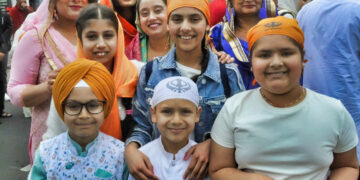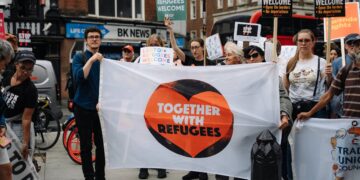A new series of lectures by guest speakers offer conclusive evidence for climate change and the likely impact it will have on all aspects of our lives. All lectures will take place at 7pm at All Saints Church in Wokingham.
14th September: The Challenge of Climate Change: Prof Sir Brian Hoskins
21st September: Responding with Faith to the Climate and Ecological Crises: Hannah Mann
12th October: Wokingham Borough Council: Climate Emergency Action Plan – WBC Officer
31st October: Energy Efficiency and Climate Action: transforming homes and businesses for a sustainable future – Simanand Gandhi-Jeyaraj
23rd November: Our changing climate: past, present & future – Prof Chris Merchant
To book, email thewalterlectures@spauls.org.uk
Climate Change: Climate Justice
Climate change is an impending crisis for the world. We need to understand the reality of climate change and the impact it will have on all our lives. It requires all of us in all countries to consider the effect on the climate in every decision we make. It is not possible to carry on as we do now. The poorest countries and the poorest people in each country will suffer the most.
How can we address the impact of climate change on the earth and how should we deliver justice to all countries and all people? We cannot afford for all countries to develop as we in England have done, and all countries and all people need to be able to benefit from changes in behaviour and technology to deliver Climate Justice to the world.
In this series of lectures, guest speakers, who are experts in their field, will explain the conclusive evidence for climate change, the likely impact it will have on all aspects of our lives and give us information to make informed choices in dealing with climate change, to deliver a just and effective response which will help all humanity live and with dignity and in peace.
The lectures will focus on:
- Evidence for climate change
- Potential effects on the weather here in Wokingham
- Effects on food availability
- Energy generation
- Environmental effects – biodiversity etc
- Government and local authority activities
- Potential changes we could make to our houses and businesses
- Risk of flooding
- How politicians view the need to act
Prof Sir Brian Hoskins
The latest science on climate change and the implications of projections for the future will be summarised. The status of international discussions on stopping dangerous climate change and the possibility and advantages of doing this in an equable manner, a just transition, will be discussed. Comments will also be made on UK progress in making its contribution. Reasons for optimism will be assessed.
Sir Brian Hoskins was the Founding Director of the Grantham Institute for Climate Change and the Environment and is now its Chair. He has been a professor in Meteorology at the University of Reading for more than 35 years, and now fills the position on a part-time basis. For 10 years he also held a Royal Society Professorship. His research is in weather and climate, in particular the understanding of atmospheric motion on all scales.
Hannah Mann
What can the world of faith, particularly Christian faith, offer in response to the climate and ecological crises? This talk will explore how the Christian faith compels a unique and powerful response amongst believers, and some of the ways that individuals, congregations and churches are making an impact through the Eco Church Programme.
Hannah has an extensive career working in environmental sustainability, initially with particular focus on active and sustainable travel and behaviour change. She has previously worked with charities including Unicef UK, Sustrans and Living Streets, before joining the National Trust where she co-ordinated an environmental sustainability network called ‘Fit for the Future’. She joined the Diocese of Oxford in January 2021 and now oversees the Environment Action Programme, which gives her an opportunity to bring together her faith and her passion for caring for creation.
WBC Officer (tbc)
In July 2019, Wokingham Borough Council members unanimously declared a climate emergency. This declaration commits the council to do as much as possible to achieve carbon neutrality by 2030. Subsequently, the council published its first Climate Emergency Action Plan establishing over 100 actions to minimise carbon emissions. This session will focus on our ambitious Climate Emergency Action Plan and the work that we are doing to tackle the climate emergency at a local level and how you can help.
Siminand Gandhi-Jeyaraj
The urgency to address climate change necessitates a proactive approach to reduce energy transfer in and out of people ’s houses, while also encouraging positive aims to explore strategies and approaches for minimising energy loss, engaging individuals in climate action, and optimising energy upgrades for both homes and business premises. By understanding how to reduce energy loss, improve domestic energy generation with storage and adopt sustainable practices, we can make significant strides towards achieving a greener future.
Siminand is the founder and director of Simple Grids Ltd. an energy-upgrade market platform. He is a mission-driven engineer embarking on the journey of accelerating decarbonisation by empowering people through technology.
Prof Chris Merchant
‘Climate change’ is often in the news, but what do all these stories add up to? What is different about the climate changes we see today and what has happened in the past? What will happen to climate in future decades, and can we influence that? This lecture will give an overview of how and why the climate of planet Earth is changing. The key points about climate change that every concerned citizen should know will be presented, with plenty of time for questions and answers.
Christopher Merchant is Professor of Ocean and Earth Observation at the University of Reading. He has worked as a climate scientist for more than 20 years. Chris and his team are recognised experts at measuring in detail the warming of the world over recent decades from sensors orbiting the Earth on satellites. Prior to joining the University of Reading, Chris taught at the University of Edinburgh, and before that he was a research engineer in the electrical industry.





















